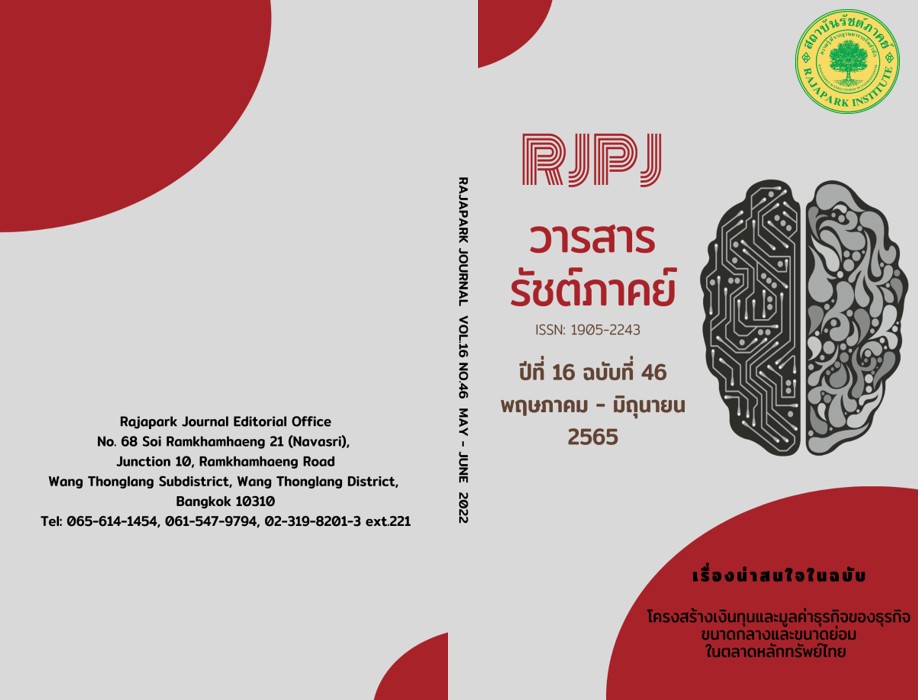Integrating Logistics Management in a Circular Economy
Main Article Content
Abstract
Environmental issues are currently a major concern throughout the world, including Thailand. Partly due to the indiscriminate use of natural resources without thorough consideration of the entire system, resulting in resource scarcity, waste problems, and other environmental issues. The Circular Economy concept entails planning ahead of time for the efficient use of resources throughout the system in order to ensure product production. The usage of those items and the reintroduction of those utilized products into the system by adding value to the system reduces the consumption of new resources and the subsequent development of waste or rubbish. Integrating logistics management is a technique or method that can assist save costs and improve operational efficiency. This article discusses approaches or systems for supporting operations, such as the just in time system, economics order quantity, material requirement planning, and lean, which, if implemented, will allow the business to manage resources in a cost-effective manner. This will result in a response to the aims of society as a whole in terms of shared responsibility for solving problems, eliminating problems, and improving the environment in order to return to a state that will allow people in our society and our children in the future to live happily.
Article Details

This work is licensed under a Creative Commons Attribution-NonCommercial-NoDerivatives 4.0 International License.
Views and opinions appearing in the Journal it is the responsibility of the author of the article, and does not constitute the view and responsibility of the editorial team.
References
Agyabeng-Mensah, Y., Ahenkorah, E., Afum, E., & Owusu, D. (2020). The Influence of Lean Management and Environmental Practices on Relative Competitive Quality Advantage and Performance. Journal of Manufacturing Technology Management, 31(7), 1351-1372.
https://doi.org/10.1108/JMTM-12-2019-0443
Apiprachyasakul, K. (2013). Warehouse and Distribution Management. Focus Media & Publishing.
Chase, R.B., Jacobs, F.B., & Aquilano, N.J. (2006). Operations Management for Competitive Advantage. McGraw-Hill.
Chiarini, A., Baccarani, C., & Mascherpa, V. (2018). Lean Production, Toyota Production System and Kaizen Philosophy: A Conceptual Analysis from the Perspective of Zen Buddhism. The TQM Journal, 30(3). https://doi.org/10.1108/TQM-12-2017-0178
CSCMP. (2021). Terms and Glossary. https://cscmp.org/
Drucker, P.F., & Maciariello, J.A. (2005). The Effective Executive in Action: A Journal for Getting the Right Things Done. Harper Business.
Durán, O., & Afonso, P.S. (2020). An Activity Based Costing Decision Model for Life Cycle Economic Assessment in Spare Parts Logistic Management. International Journal of Production Economics, 222. https://doi.org/10.1016/j.ijpe.2019.09.020
Ellen MacArthur Foundation. (2019, February). Circular Economy Systems Diagram. Ellen MacArthur Foundation. https://ellenmacarthurfoundation.org
Ghobakhloo, M., Azar, A., & Fathi, M. (2018). Lean-green Manufacturing: The Enabling Role of Information Technology Resource. Kybernetes, 47(9), 1752–1777. https://doi.org/10.1108/K-09-2017-0343
Komanasin, K. (2013). Lean: A Method of Adding Value to the Most Valuable Organization (4th ed.). Amarin.
Loppolo, G., Cucurachi, S., Salomone, R., Saija, G., & Ciraolo, L. (2014). Industrial Ecology and Environmental Lean Management: Lights and Shadows. Sustainability, 6(9), 6362–6376. https://doi.org/10.3390/su6096362
Marchesini, M.M.P., & Alcântara, R.L.C. (2016). Logistics Activities in Supply Chain Business Process: A Conceptual Framework to Guide Their Implementation. The International Journal of Logistics Management, 27(1), 6-30. https://doi.org/10.1108/IJLM-04-2014-0068
Macchi, M., Savino, M., & Roda, I. (2020). Analysing the Support of Sustainability in the Manufacturing Strategy through a Multiple Perspectives of Different Business Functions. Journal of Cleaner Production, 258(1), 120771. https://doi.org/10.1016/j.jclepro.2020.120771
Manopawit, P. (2018, July 11). Circular Economy: Not Simply a Chance, but Also a Means of Surviving. The101.World. https://www.the101.world/circular-economy/
Ministry of Natural Resources and Environment. (2015). Strategic Plan of Ministry of Natural Resources and Environment B.E. 2559-2564 (2016-2021). file:///C:/Users/HP/Downloads/plan59-64.pdf
Mosca, A., Vidyarthi, N., & Satir, A. (2019). Integrated Transportation-Inventory Models: A Review. Operations Research Perspectives, 6. https://doi.org/10.1016/j.orp.2019.100101
Nobil, A.H., Sedigh A.H.A., & Cárdenas-Barrón L.E. (2020). Reorder Point for The EOQ Inventory Model with Imperfect Quality Items. Ain Shams Engineering Journal, 11(4), 1339-1343. https://doi.org/10.1016/j.asej.2020.03.004
Pollution Control Department. (2020). Solid Waste Management Information System. Pollution Control Department. https://thaimsw.pcd.go.th/index.php
Pooya, A., & Pakdaman, M. (2019). Optimal Control Model for Finite Capacity Continuous MRP with Deteriorating Items. Journal of Intelligent Manufacturing, 30, 2203–2215. https://doi.org/10.1007/s10845-017-1383-6
Research Community of Bio Economy, Circular Economy, and Green Economy. (2018). White Paper BCG in Action, Development of Science Technology and Innovation of Thailand for Bio Economy, Circular Economy, and Green Economy. file:///C:/Users/HP/Downloads/20191129-BCG_Final1.pdf
Samanbutra, C. (2018). Warehouse Management and Inventory. Rangsit University.
Sorat, T. (2009). Warehouse & Distribution Management. V-Serve Logistics.
Stock, J., & Lambert, D. (2001). Strategic Logistics Management (4th ed.). McGraw-Hill.
Suharitdamrong, V. (2004). Way of Logistics and Supply Chain. E.I. Square.
Taghipour, A., Hoang, P., & Cao, X. (2020). Just in Time/Lean Purchasing Approach: An Investigation for Research and Applications. Journal of Advanced Management Science, 8(2), 43-48. DOI: 10.18178/joams.8.2.43-48
The Office of National Higher Education Science Research and Innovation Policy Council [NXPO]. (2021). White Paper: System Development for a Circular Economy Transition. NXPO. https://www.nxpo.or.th/th/report/6724/
Tokyo. (2020). The Medals. Oiympics. https://olympics.com/en/olympic-games/tokyo-2020/medal-design


